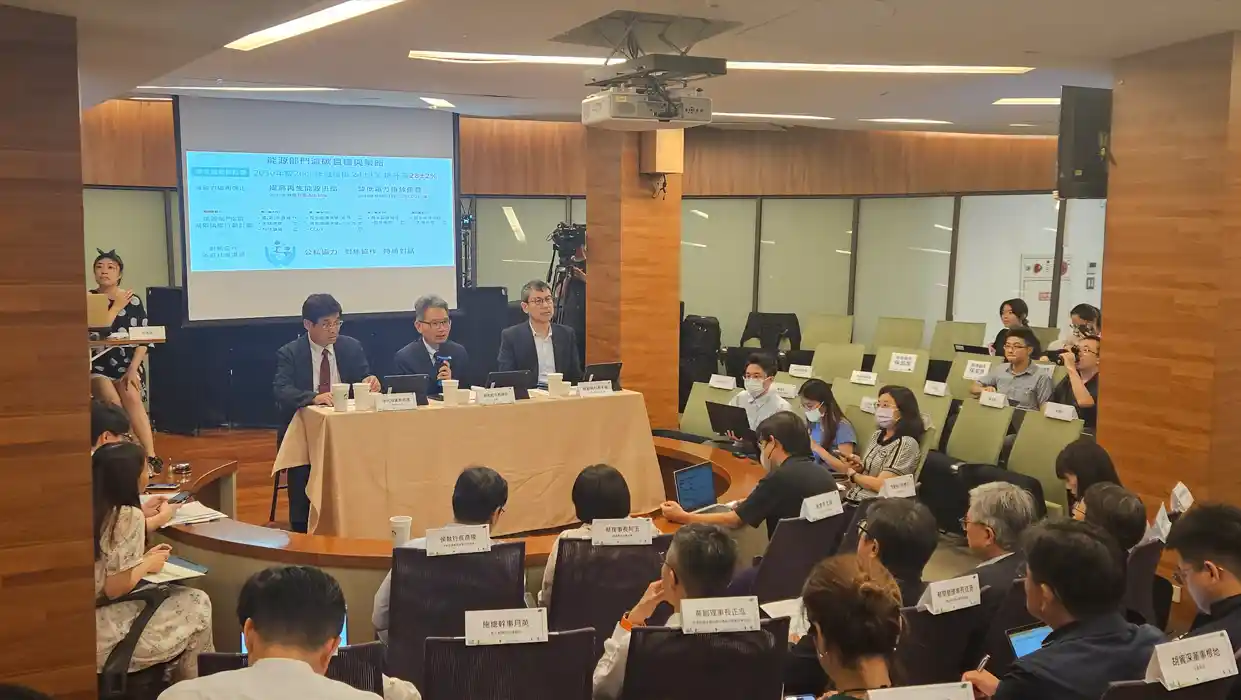MOEA Convenes Offshore Wind and Solar Public Engagement Meetings Commits to Ongoing Collaboration with Civil Society to Address Key Challenges
MOEA Convenes Offshore Wind and Solar Public Engagement Meetings Commits to Ongoing Collaboration with Civil Society to Address Key Challenges
 Chien-Hsin Lai, Vice Minister of the Ministry of Economic Affairs (MOEA), presided over the Offshore Wind and Solar Public Engagement Meetings.
Chien-Hsin Lai, Vice Minister of the Ministry of Economic Affairs (MOEA), presided over the Offshore Wind and Solar Public Engagement Meetings.
The Ministry of Economic Affairs (MOEA) held public engagement meetings on offshore wind and solar energy development on June 16 and 17, focusing on the draft of the flagship carbon reduction project for the energy sector. Participants exchanged views on the environmental impact monitoring of wind and solar projects, compatibility with agriculture and fisheries, project review mechanisms, public engagement methods, and information transparency. The MOEA will incorporate the participants' input to enhance the flagship carbon reduction project and will continue engaging with civil society through a regular collaborative mechanism to seek viable solutions that balance green energy development with environmental protection.
To ensure solution-oriented discussions, the MOEA first held five preparatory focus meetings on May 19 to clarify key issues, followed by four public engagement sessions involving stakeholders to explore potential solutions. Building upon past discussions and the focus meetings, the June 16–17 sessions addressed topics such as offshore wind environmental monitoring, communication mechanisms with the fishing industry, and verification criteria of fishing and electricity symbiosis projects. Attendees engaged in constructive dialogue and proposed practical solutions. The MOEA will take these inputs into account to revise relevant offshore wind and solar energy flagship projects and use them as the foundation for future regular public engagement.
Vice Minister Chien-Hsin Lai of the MOEA stated that to strengthen the basis for offshore wind public engagement, the ministry will consider establishing a marine development data platform and conducting long-term, effective, and transparent environmental monitoring and systematic assessments to support policy-making and wind farm management. To mitigate impacts on fisheries, the MOEA will also review civil society's proposed Guidance on Taiwan Offshore Wind and Fisheries Liaison for potential adoption by the offshore wind industry. Companies that take proactive steps may be eligible for appropriate incentives to promote the coordinated development of green energy and environmental sustainability. Regarding emerging offshore wind technologies such as floating offshore wind, the MOEA plans to include pilot research in its flagship projects.
On solar energy development, Vice Minister Lai noted that to address public concerns over solar project installations, the MOEA has collaborated with the Ministry of Justice and the Ministry of Agriculture to establish a Solar Power Information Transparency Portal to enhance public oversight. For issues regarding permitting and verification of aquaculture activities in fishing and electricity symbiosis projects, the MOEA will coordinate with the Ministry of Agriculture to enhance supportive measures under the Fishing and Electricity Symbiosis 4.0 program. For rooftop solar projects, the MOEA will continue to assess and promote deployment in collaboration with relevant ministries, evaluating the feasibility of diverse PV types and self-consumption microgrids, coupled with appropriate incentives to encourage participation by local governments, industry, and the public. For infrastructure such as feeder lines and shared transformer stations needed by solar projects, the MOEA will integrate planning with energy storage and other essential infrastructure.
The MOEA emphasized that public support is the foundation of green energy development. Strengthening communication with stakeholders is key to successful implementation. As shared understanding leads to shared conclusions, the ministry will enhance transparency in future public engagements, build common ground through informed dialogue and focused discussions, and invite civil society groups to join in public-private collaboration to find innovative solutions that balance renewable energy deployment, environmental protection, and regional prosperity.
